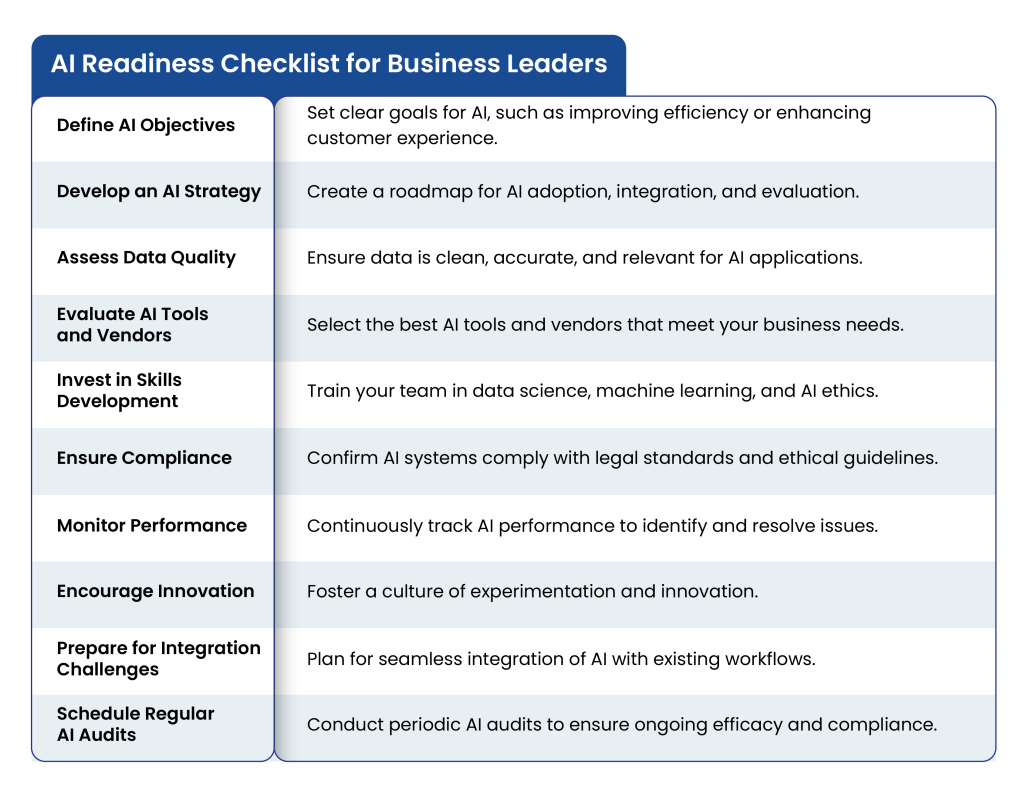Is Your Business Ready for an AI Audit? 3 Key Signs It’s Time

Artificial intelligence (AI) is rapidly transforming industries, with businesses across the spectrum leveraging its power to automate tasks, improve decision-making, and gain a competitive edge. A recent PWC report suggests that by 2030, AI could contribute up to $15.7 trillion to global GDP. However, alongside the immense potential of AI lies the responsibility for responsible implementation. According to a global survey by McKinsey, the adoption of AI in standard business processes has increased by nearly 25% year-over-year. Notably, there has been a significant rise in the number of companies deploying AI across multiple areas of their operations. The survey revealed that 58% of executives reported their organizations have integrated at least one AI capability into a process or product within at least one function or business unit.
This is where the concept of an AI audit emerges. An AI audit is a comprehensive assessment of a business’s AI systems, designed to identify potential risks, biases, and areas for improvement. It’s akin to a financial audit, but with a focus on the ethical and operational health of your AI infrastructure.
3 Signs Your Business Needs an AI Audit Right Now
- Lack of Transparency and Explainability: Many AI systems, particularly complex deep learning models, can be opaque in their decision-making processes. This lack of transparency can lead to concerns about fairness and bias, especially if the model is used for sensitive applications like loan approvals or hiring decisions. An AI audit can assess the explainability of your models, identify potential biases in the training data, and suggest strategies for mitigating them.
- Uncertainty Around Regulations: The regulatory landscape surrounding AI is still evolving, but there’s a growing emphasis on responsible AI development and deployment. The European Union’s General Data Protection Regulation (GDPR) has imposed fines totaling over €294 million for data protection violations since its implementation. An AI audit can help ensure your business is compliant with current and anticipated regulations, preventing potential legal ramifications.
- Limited Return on Investment (ROI) or Inconsistent AI Performance: While AI holds immense promise, poorly implemented systems can lead to disappointing results. An AI audit can assess the effectiveness of your existing AI deployments, identify areas for improvement, and help optimize your models for better returns. AI systems are designed to perform consistently, but if you notice fluctuations in output quality or accuracy, it may be time for an audit. For instance, if your predictive analytics tool is generating less reliable forecasts or your chatbot is providing inconsistent responses, these could be red flags. Inconsistent performance might indicate underlying issues such as data drift, model degradation, or even biases in the algorithm. A study by Gartner predicts that through 2022, 85% of AI projects will deliver erroneous outcomes due to bias in data, algorithms, or the teams managing them
How an AI Audit Can Unlock New Opportunities for Your Business
Beyond mitigating risks, an AI audit can be a catalyst for unlocking new opportunities. A McKinsey study indicates that companies leveraging AI in the next five to seven years are projected to boost their cash flow by over 120% by 2030. Conversely, companies that do not adopt AI are expected to experience a 23% decline in cash flow over the same period. Here are some key benefits:
- Improved Decision-Making: By identifying potential biases and enhancing the explainability of AI models, audits can lead to more informed and trustworthy decision-making across the organization.
- Enhanced Customer Experience: AI-powered chatbots or recommendation engines can significantly improve customer interactions. However, biased algorithms can lead to negative experiences. An AI audit can ensure your AI delivers fair and positive experiences for all customers.
- Streamlined Operations: Automating repetitive tasks through AI can free up human resources for more strategic activities. An AI audit can identify opportunities for further automation, optimizing your operational efficiency and cost structure.
The 4 Key Steps to Conducting a Comprehensive AI Audit
- Scoping and Planning: The initial stage involves defining the scope of the audit, identifying the AI systems to be assessed, and aligning the audit with your overall business objectives.
- Data Analysis and Assessment: This stage involves analyzing the training data used to develop the AI models, identifying potential biases in demographics or historical trends. Explainability techniques can be used to understand how the models reach their conclusions.
- Risk Identification and Mitigation: Based on the analysis, potential risks associated with fairness, security, and regulatory compliance are identified. Strategies to mitigate these risks are then formulated.
- Recommendations and Reporting: The final stage involves summarizing the findings and recommendations in a comprehensive report. This report will guide your business on addressing identified issues and optimizing your AI strategy.
Preparing Your Business for the AI-Powered Future
An AI audit is not just about identifying problems; it’s a proactive step towards building a robust and responsible AI foundation for your business. With a well-defined AI strategy and a commitment to ethical implementation, businesses can harness the power of AI to gain a significant competitive advantage in the years to come.
As AI continues to reshape the business landscape, conducting an AI audit is no longer a question of “if” but “when.” By proactively addressing potential risks and optimizing your AI systems, you can unlock new opportunities, build trust with stakeholders, and future-proof your business for the AI-powered era.
Considering an AI Audit? For a comprehensive and trusted AI audit solution, explore Integra’s AI Consultancy Services. Our team of experts can help you assess your AI systems, identify areas for improvement, and develop a future-proof AI strategy for your organization.
Recent Blogs

From Disruption to Direction: Reflections on a Year of Change in European Publishing

Why LaTeX Still Matters in Scholarly Publishing—and How the Right Partner Makes All the Difference



